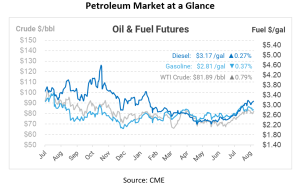
5 Essential Steps After Being Hit by a Hurricane
When a hurricane leaves its trail of destruction, the path to recovery can feel overwhelming. As the storm clears and the waters recede, the task of rebuilding begins. To help you navigate this challenging phase, we’ve put together five essential tips to guide your recovery journey.
From assessing damage to ensuring vital services, these steps can be your roadmap to a faster, smoother recovery for your fueling infrastructure. With insights from our experts, we’re here to help you restore your business with confidence.
- Assess Infrastructure Damage and Fuel Supply
After the storm recedes, you must assess the extent of damage to fuel infrastructure, including storage tanks and delivery systems. Collaborate with fuel professionals to evaluate the condition of fuel reserves and ensure they remain uncontaminated. Contact your fuel provider to coordinate fuel supply replenishment.
- Prioritize Essential Services
Identify your critical services such as emergency responders, healthcare facilities, and utilities that require immediate fuel access. Establish a hierarchical fuel distribution system, ensuring that these vital services receive priority to maintain community well-being.
- Collaborate with Partners
Engage closely with fuel providers and transportation partners to strategize recovery efforts. Communicate your organization’s needs and work together to expedite fuel deliveries. Maintain open lines of communication to adapt to changing circumstances quickly.
- Expedite Infrastructure Repairs
Quickly fix any damage to fuel storage tanks, pipelines, and delivery equipment. Work closely with repair experts to make sure the fuel is clean and safe to use and keep track of progress as the fuel supply chain gets fixed. Prioritize repairs to avoid prolonged fuel shortages.
- Implement Emergency Response Lessons
Utilize insights gained from the hurricane experience to refine and reinforce your emergency response plan. Once the storm has passed, review what went well and what could be improved. If you need to make changes or want expert insights, talk to your fuel supplier. Adjust your strategies based on what you’ve learned to be better prepared for future emergencies. Remember, getting advice from experts can bring fresh ideas and improvements that make a big difference in handling similar situations more effectively.
These five steps offer essential tips for organizations and communities to rebound after a hurricane. By promptly assessing damage, collaborating with partners, and prioritizing critical services, it is possible to effectively recover from the aftermath and keep your business running effectively. Remember, post-hurricane recovery is a collective effort that requires proactive planning and collaboration to ensure a smooth transition toward rebuilding and renewal.
In need of expert guidance? Talk to Mansfield!
Mansfield Energy, North America’s leading fuel distributor, brings a wealth of expertise to the table in creating a robust emergency response program tailored to your company’s needs. With an extensive network servicing the US and Canada, Mansfield understands the critical importance of proactive measures in facing potential disruptions caused by hurricanes. Leveraging their in-depth knowledge, Mansfield has developed a comprehensive Emergency Response Fuel program that encompasses industry best practices. Mansfield’s program offers a multi-tiered approach, prioritizing essential services and collaborating closely with partners to ensure seamless fuel distribution during emergencies. Contact us today!

This article is part of Daily Market News & Insights
MARKET CONDITION REPORT - DISCLAIMER
The information contained herein is derived from sources believed to be reliable; however, this information is not guaranteed as to its accuracy or completeness. Furthermore, no responsibility is assumed for use of this material and no express or implied warranties or guarantees are made. This material and any view or comment expressed herein are provided for informational purposes only and should not be construed in any way as an inducement or recommendation to buy or sell products, commodity futures or options contracts.





